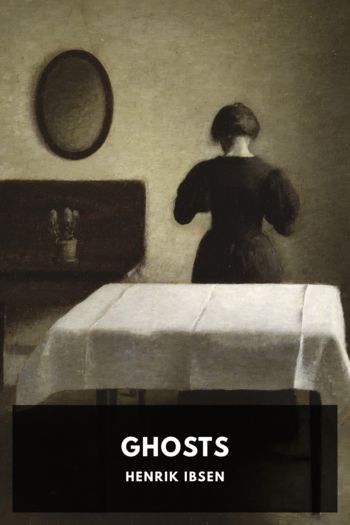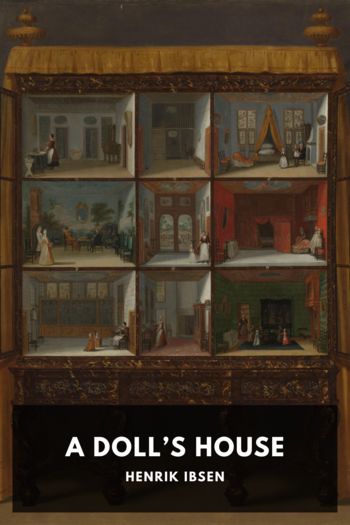Ghosts by Henrik Ibsen (best novels of all time .TXT) 📕

Description
Written in 1881, when melodrama and farce were still at their peak of popularity, Ibsen’s Ghosts is a three-act tragedy that explores uncomfortable, even forbidden themes. It is also a highly critical commentary on the morality of the day. The play centers around the widow of a prominent Norwegian sea captain whose son returns home and, with tragic consequences, revives the ghosts of the past that she has long labored to put to rest.
Ghosts immediately became a source of controversy for its inclusion of topics like venereal disease, incest, and euthanasia, and it was banned from being performed in England for many years. Its arrival signals a shift in the nature of theatre and, despite negative criticism, it was translated into other languages and performed in Sweden, Germany, and New York within a few years of its debut. It stands now as one of the works considered to have ushered in the era of modern drama.
Read free book «Ghosts by Henrik Ibsen (best novels of all time .TXT) 📕» - read online or download for free at americanlibrarybooks.com
- Author: Henrik Ibsen
Read book online «Ghosts by Henrik Ibsen (best novels of all time .TXT) 📕». Author - Henrik Ibsen
Not until April 1886 was Gespenster acted in Germany, and then only at a private performance, at the Stadttheater, Augsburg, the poet himself being present. In the following winter it was acted at the famous Court Theatre at Meiningen, again in the presence of the poet. The first (private) performance in Berlin took place on January 9, 1887, at the Residenz Theater; and when the Freie Bühne, founded on the model of the Paris Theatre Libre, began its operations two years later (September 29, 1889), Gespenster was the first play that it produced. The Freie Bühne gave the initial impulse to the whole modern movement which has given Germany a new dramatic literature; and the leaders of the movement, whether authors or critics, were one and all ardent disciples of Ibsen, who regarded Gespenster as his typical masterpiece. In Germany, then, the play certainly did, in Ibsen’s own words, “move some boundary-posts.” The Prussian censorship presently withdrew its veto, and on November 27, 1894, the two leading literary theatres of Berlin, the Deutsches Theater and the Lessing Theater, gave simultaneous performances of the tragedy. Everywhere in Germany and Austria it is now freely performed; but it is naturally one of the least popular of Ibsen’s plays.
It was with Les Revenants that Ibsen made his first appearance on the French stage. The play was produced by the Théâtre Libre (at the Théâtre des Menus-Plaisirs) on May 29, 1890. Here, again, it became the watchword of the new school of authors and critics, and aroused a good deal of opposition among the old school. But the most hostile French criticisms were moderation itself compared with the torrents of abuse which were poured upon Ghosts by the journalists of London when, on March 13, 1891, the Independent Theatre, under the direction of Mr. J. T. Grein, gave a private performance of the play at the Royalty Theatre, Soho. I have elsewhere placed upon record some of the amazing feats of vituperation achieved of the critics, and will not here recall them.1 It is sufficient to say that if the play had been a tenth part as nauseous as the epithets hurled at it and its author, the Censor’s veto would have been amply justified. That veto is still (1906) in force. England enjoys the proud distinction of being the one country in the world where Ghosts may not be publicly acted. In the United States, the first performance of the play in English took place at the Berkeley Lyceum, New York City, on January 5, 1894. The production was described by Mr. W. D. Howells as “a great theatrical event—the very greatest I have ever known.” Other leading men of letters were equally impressed by it. Five years later, a second production took place at the Carnegie Lyceum; and an adventurous manager has even taken the play on tour in the United States. The Italian version of the tragedy, Gli Spettri, has ever since 1892 taken a prominent place in the repertory of the great actors Zaccone and Novelli, who have acted it, not only throughout Italy, but in Austria, Germany, Russia, Spain, and South America.
In an interview, published immediately after Ibsen’s death, Björnstjerne Björnson, questioned as to what he held to be his brother-poet’s greatest work, replied, without a moment’s hesitation, Gengangere. This dictum can scarcely, I think, be accepted without some qualification. Even confining our attention to the modern plays, and leaving out of comparison The Pretenders, Brand, and Peer Gynt, we can scarcely call Ghosts Ibsen’s richest or most human play, and certainly not his profoundest or most poetical. If some omnipotent Censorship decreed the annihilation of all his works save one, few people, I imagine, would vote that that one should be Ghosts. Even if half a dozen works were to be saved from the wreck, I doubt whether I, for my part, would include Ghosts in the list. It is, in my judgment, a little bare, hard, austere. It is the first work in which Ibsen applies his new technical method—evolved, as I have suggested, during the composition of A Doll’s House—and he applies it with something of fanaticism. He is under the sway of a prosaic ideal—confessed in the phrase, “My object was to make the reader feel that he was going through a piece of real experience”—and he is putting some constraint upon the poet within him. The action moves a little stiffly, and all in one rhythm. It lacks variety and suppleness. Moreover, the play affords some slight excuse for the criticism which persists in regarding Ibsen as a preacher rather than as a creator—an author who cares more for ideas and doctrines than for human beings. Though Mrs. Alving, Engstrand and Regina are rounded and breathing characters, it cannot be denied that Manders strikes one as a clerical type rather than an individual, while even Oswald might not quite unfairly be described as simply and solely his father’s son, an object-lesson in heredity. We cannot be said to know him, individually and intimately, as we know Helmer or Stockmann, Hialmar Ekdal or Gregors Werle. Then, again, there are one or two curious flaws in the play. The question whether Oswald’s “case” is one which actually presents itself in the medical books seems to me of very trifling moment. It is typically true, even if it be not true in detail. The suddenness of the catastrophe may possibly be exaggerated, its premonitions and even its essential nature may be misdescribed. On the other hand, I conceive it probable that the poet had documents to found upon, which may be unknown to his critics. I have never taken any pains to satisfy myself upon the point, which seems to me quite immaterial. There is not the slightest





Comments (0)